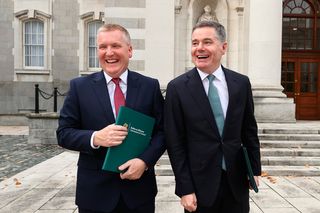€1,000 boost for families in Budget as tax and USC cuts on cards
Expenditure Minister Michael McGrath outlined to Fianna Fáil TDs how much a range of specific tax cuts would cost if agreed by the Coalition

The average worker could get tax cuts of almost €1,000 a year in the Budget if the Government introduces a suite of measures outlined this week.
Public Expenditure Minister Michael McGrath has presented a potential €1.8bn Budget package containing sweeping reductions to income taxes and the USC, along with increases in tax credits.
If all the measures were to be announced on Budget Day, a taxpayer earning €45,000 a year could save as much as €959 per year.
Mr McGrath gave a presentation at the Fianna Fáil think-in earlier this week that set out some of the key tax measures being considered by the Government ahead of the Budget on September 27.
Read more
He outlined how much a range of specific tax cuts would cost should they be agreed by the three coalition leaders.
Ministers are considering increasing standard income rate bands by €2,500, a move that would cost the State €657m a year.
A 2pc increase to the USC band of €1,500 is projected to cost €129m and reducing the 4.5pc band by 1pc would cost €498m.
Other tax cuts being considered include an increase in personal tax credits of €100 for single people and €200 for married people to €1,800 and €3,600 respectively.
This is projected to cost €295m in a full year.
The PAYE credit may also be raised by €100, from €1,700 to €1,800, which would cost €226m.
These tax cuts alone would cost more than €1.8bn. However, ministers have indicated there will be a tax package of around €1bn in the Budget.
A Government source urged caution on the full package of possible proposals, saying it is likely some measures will be included in the Budget, but not all.
Ministers have previously indicated a tax package of €1bn will be introduced in the €6.7bn Budget, alongside a suite of one-off cost-of-living measures.
Mr McGrath’s costings were not provided for a 30pc tax rate, which has been mooted by Fine Gael leader and Tánaiste Leo Varadkar.
He has promised tax cuts which would help the “squeezed middle” the most.
Mr Varadkar has said that his proposal for a new middle- income tax rate of 30pc is still “on the table” and that nothing has been decided in advance of the Budget.
“It’s still an option I’ve asked to be considered,” Mr Varadkar said.
“There are a number of things that have to be considered in that regard, particularly when the Revenue Commissioners would be able to bring it into effect.”
He said this would not be straightforward and would take time to come into effect but insisted a cut in taxes would be announced later this month.
“The most important thing is that middle-income people will see a substantial reduction in the amount of income tax they pay,” he said.
High-level budgetary negotiations are under way within Government and the first day of the Dáil resuming after the summer recess was dominated by the cost-of-living crisis.
Sinn Féin leader Mary Lou McDonald has said the €200 electricity payment earlier this year had been “gobbled up” before it was even paid out. She insisted it would be a flawed approach.
The party has instead proposed a reduction in energy prices to pre-crisis levels through a cap on any future price rises.
However, Taoiseach Micheál Martin challenged Sinn Féin to produce detailed costed proposals.
The Government has indicated that while it is examining price caps, similar to that announced by new British prime minister Liz Truss in the UK last week, it is more likely to use electricity credits.
“What you are proposing would amount to a blank cheque to the energy companies,” Mr Martin told the Sinn Féin leader.
Join the Irish Independent WhatsApp channel
Stay up to date with all the latest news















